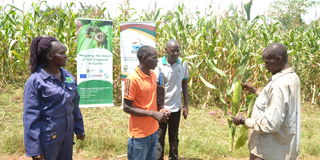Prime
Nakaseke farmers turn to natural pesticides to fight armyworm

Researchers from NARO interact with farmers in Kisoga Village, Nakaseke District, on July 31. PHOTO/DAN WANDERA
What you need to know:
Mr Ssali Kakyima Ssalongo, the chairperson of Wakyato Sub-county, explains that at the time, the government recommended synthetic pesticides as an effective way to contain the armyworm that was destroying several crops, especially maize
When the fall armyworm invaded parts of Nakaseke Districts in 2019, a section of farmers did not apply the recommended synthetic pesticides in fear of their side effects on their livestock and crops.
Mr Ssali Kakyima Ssalongo, the chairperson of Wakyato Sub-county, explains that at the time, the government recommended synthetic pesticides as an effective way to contain the armyworm that was destroying several crops, especially maize.
However, he said a section of farmers were hesitant to apply Rocket pesticide that was effective in destroying the worms for fear that it had long-term side effects on cattle, goats and sheep.
“When the trials for the bio-pesticides were introduced and farmers sensitised about the natural elements that have no effect on humans and animals, the farmers quickly embraced the use of Nimbecidine to control the fall army worm,” he says.
Mr Ronald Kalema, a farmer and resident of Kisoga Village in Wakyato Sub-county, explains that extension workers explain that the risks involved in applying the synthetic pesticides apply only if the farmers fail to comply with the guidelines.
“As a maize farmer, I have also opted for the bio-pesticides because of the low health risks since some of the pesticides are extracted from plants, including the Neem tree,” he says.
Ms Stella Adumo, a researcher from the National Agricultural Research Organisation (NARO), explains that when the fall armyworm invaded several farm fields in Uganda in 2016, the government through the Ministry of Agriculture made several interventions to fight it. The worms were capable of destroying 100 percent of crops if not sprayed with recommended pesticides.
“But NARO was also engaged in developing a more sustainable way of reducing the fall armyworm. NARO teamed up with researchers at the National Crops Resources Research Institute Namulonge to develop the bio-pests, including Ninbecidine extracted from the Neem tree, as a more sustainable pesticide,” she says.
Expert speaks
“For the last two seasons, the farmers have used the bio-pesticides that kill the fall armyworm. Ninbecidine is non synthetic and is also not dangerous to humans, animals and the environment. I believe that its success in parts of Uganda will boost the fight to protect our environment,” she adds.
Mr Ignatius Kiwanuka Koomu, the Nakaseke District chairperson, explains that the farmer losses resulting from the fall army worm were noticed in the areas of Ngoma, Wakyato and Kinoni sub-counties.
“The introduction of the bio-pesticides could help the farmers fight the fall armyworm better,” he says.
Statistics from the Nakaseke District Production office reveal that about 1,700 acres of the maize gardens were destroyed by the fall armyworm between 2017 and 2021.





